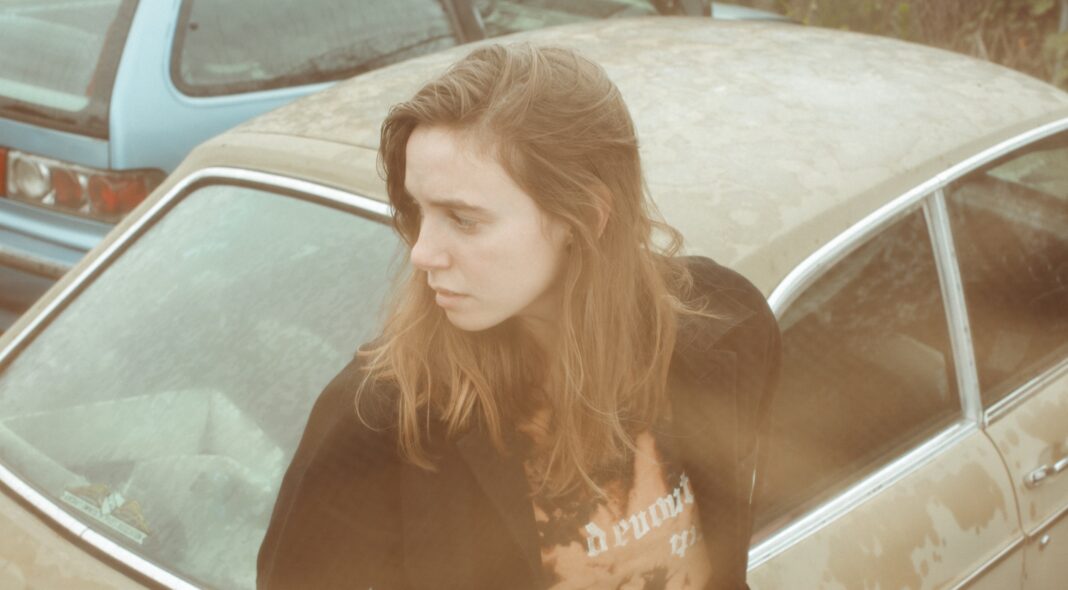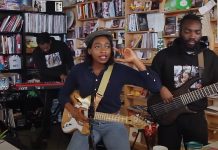When Julien Baker was ten years old she asked her father what depression felt like. He replied, “It’s like trying to fill in a giant hole and you’re standing there with your shovel with dirt, and you keep filling in the hole, and the hole is still there.” And as if in some terrible dream, the more you put into the hole, the bigger it gets.
Baker’s since grown acquainted with that feeling, and her third album ‘Little Oblivions’ almost translates her father’s words into music. The more noise she pours into the record, the bigger it becomes. In his beautiful announcement essay for ‘Little Oblivions’, Hanif Abdurraqib describes Baker as “a writer who examines their own mess, not in a search for answers, but sometimes just for a way out. A lighthouse to some newer, bigger mess.” She’s gotten louder with each new record, sound spreading out rapidly, from tiny spill of torchlight to lighthouse beam.
The Tennessee musician’s debut record ‘Sprained Ankle’ sounded as fragile as its title: voice and guitar and spiritual turmoil. ‘Turn Out The Lights’, her acclaimed 2017 follow-up, added an amp to proceedings, sleeve still caught on philosophical concepts. In the following years, Baker finished her degree, released an EP as part of supergroup boygenius with Phoebe Bridgers and Lucy Dacus – and hit the skids in 2019, a tough year she documents with radical candour on her new record.
‘Little Oblivions’ plummets to earth, fast. Cars, bars, and gurneys play host to blackouts, benders, and bloodied survival. ‘Crying Wolf’ describes with eye-watering honesty a relapse after an AA meeting, while ‘Favor’, on which her boygenius bandmates Bridgers and Dacus supply backing vocals, describes the impact of mental health on friends. ‘Heatwave’ relays some kind of tragic car accident. “It’s worse than death, that life, compressed to fill a page in the Sunday paper; and I had the shuddering thought: ‘this was gonna make me late for work,’” she sings, accomplished storytelling that redeems the slightly plastic-emo lyricism of other tracks like ‘Ringside’ and ‘Song in E’.
But religious doubt lingers, in pleas to Jesus or to any god going. “I’ll believe you if you make me feel something,” she appeals on ‘Faith Healer’. The record opens with an organ, churchy but chopped up, as if stalled between holiness and camp pop melodrama. A minute in to the track – ‘Hardline’ – drums swing confidently into action. The alt-rock crescendo let loose by the climactic “what if it’s all black, baby, all the time?” cuts off too early, but then the rest of the record steps in to quench that thirst. And Baker plays pretty much every instrument you hear.
Music and lyrics walk a similar line on ‘Little Oblivions’, and there’s not much sonic variance. “I’m stuck inside a vision that repeats, repeats, repeats,” she sings towards its end. But the pounding, angsty alt-rock balances the inner bedlam that floods her lyrics. These songs sound nothing like country, but Baker’s words come cloaked in country gloom. “I love Hank Williams,” she once said, “he’s the original emo kid”.
Hank’s songs have a raw and recurring discomfort too. While Julien Baker’s louder, heavier direction on ‘Little Oblivions’ offers catharsis, it actually brings you deeper inside her experiences, to a relentlessly uncomfortable degree. She picks herself up off the floor over and over, track after track, and your work as listener is similar. You have to let the album drag you away in the dark, let yourself get a bit destroyed, and in return? You might find a reason to believe that someday the giant hole gets filled.







